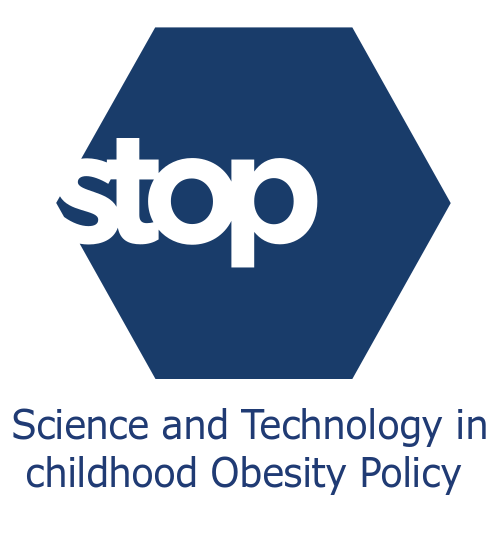The project website
The STOP website (www.stopchildobesity.eu) went online in October 2018. A one-page scrolling website containing links to news, downloads and deliverables, its goal is to raise awareness of the project and explain how STOP is addressing the issue of child obesity. It will also showcase the extensive portfolio of results from the project as these become available.
 It offers an overview of the project and its intended impacts, and includes an explainer video from Imperial College that sets out how child obesity has become so prevalent. There are links to the project’s 31 consortium partners, as well as to other resources that can help researchers, journalists, policy makers and the general public learn more about the problem of child obesity and what can be done about it.
It offers an overview of the project and its intended impacts, and includes an explainer video from Imperial College that sets out how child obesity has become so prevalent. There are links to the project’s 31 consortium partners, as well as to other resources that can help researchers, journalists, policy makers and the general public learn more about the problem of child obesity and what can be done about it.
Users of the website can stay updated on the project’s events and results by browsing the latest news. There is also a separate section for downloads and deliverables where members of the public can download brochures, newsletters, and the project’s reports.
Social media
 We have also recently launched the STOP Twitter channel at @STOPobesityEU. Follow us to keep up-to-date with project developments, events we are involved with, and relevant stories from our consortium partners and beyond. If you use Twitter and are tweeting about STOP or anything related, we ask you to tag our account in it and also use the hashtag #STOPobesityEU. As the project progresses and develops our Twitter will be become busier and busier so do give us a follow!
We have also recently launched the STOP Twitter channel at @STOPobesityEU. Follow us to keep up-to-date with project developments, events we are involved with, and relevant stories from our consortium partners and beyond. If you use Twitter and are tweeting about STOP or anything related, we ask you to tag our account in it and also use the hashtag #STOPobesityEU. As the project progresses and develops our Twitter will be become busier and busier so do give us a follow!
Other project websites
Work has also begun on two other STOP-related websites: Business Impact Assessment (BIA) Obesity Europe and the WOF youth-facing website.
BIA Obesity Europe
 BIA Obesity Europe is short for “business impact assessment on obesity and population level nutrition in Europe” and will benchmark company nutrition policies and commitments, disclosure and performance. The initiative will assess the largest European food companies on their policies and commitments related to obesity prevention and nutrition across three major food industry sectors: supermarkets; food and beverage manufacturers; and quick service restaurants. The objective is to highlight where food companies are demonstrating leadership in relation to obesity prevention and nutrition, and identify areas for improvement. More information will be available in April at www.bia-obesity.org.
BIA Obesity Europe is short for “business impact assessment on obesity and population level nutrition in Europe” and will benchmark company nutrition policies and commitments, disclosure and performance. The initiative will assess the largest European food companies on their policies and commitments related to obesity prevention and nutrition across three major food industry sectors: supermarkets; food and beverage manufacturers; and quick service restaurants. The objective is to highlight where food companies are demonstrating leadership in relation to obesity prevention and nutrition, and identify areas for improvement. More information will be available in April at www.bia-obesity.org.
The WOF youth-facing website
Consortium partner World Obesity Federation have recently started work on their youth-facing website on obesity and related policies – a key deliverable for Work Package 11 on dissemination. The website will be a space for adolescents to gain information around childhood obesity policies and their development, as well as a space for young people who are interested to discuss these issues with like-minded people. Finally, it will provide materials to help young people advocate with peers, families, professionals and organisations on policies relating to childhood obesity, contributing to building a movement of engaged young people on health issues and policies.
While the site was due to be completed towards the end of the project in 2021, its development has been brought forward. Watch this space for more information in due course!

